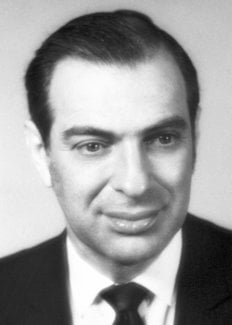Kenneth J. Arrow
Biographical

I was born in the city of New York on August 23, 1921. My undergraduate education, at the City College in New York, was made possible only by the existence of that excellent free institution and the financial sacrifices of my parents. I was graduated in 1940 with a degree of Bachelor of Science in Social Science but a major in Mathematics, a paradoxical combination that was prognostic of my future interests. I entered Columbia University for graduate study and received an M.A. in Mathematics in June, 1941, but under the influence of the statistician-economist, Harold Hotelling, I changed to the Economics Department for subsequent graduate work.
My graduate study was interrupted, like that of many others, by World War II. From 1942-1946, I served as a weather officer in the United States Army Air Corps rising to the rank of Captain. My assignment was exclusively in the research field, and my first published paper, On the Optimal Use of Winds for Flight Planning, was the outgrowth of that work. The years 1946-1949 were spent partly as a graduate student at Columbia University, partly as a research associate of the Cowles Commission for Research in Economics at the University of Chicago, where I also had the rank of Assistant Professor of Economics in 1948-1949. The brilliant intellectual atmosphere of the Cowles Commission, with eager young econometricians and mathematically-inclined economists under the guidance of Tjalling Koopmans and Jacob Marschak, was a basic formative influence for me, as was also the summers of 1948 and subsequent years at the RAND Corporation in the heady days of emerging game theory and mathematical programming. My work on social choice and on Pareto efficiency dated from this period.
In 1949 I was appointed Acting Assistant Professor of Economics and Statistics at Stanford University and remained there until 1968, becoming eventually Professor of Economics, Statistics, and Operations Research. At various times during this period, I was a Social Science Research fellow, 1952, a Fellow of the Center for Advanced Study in the Behavioral Sciences, 1956-57, Economist on the staff of the United States Council of Economic Advisors, 1962, Executive Head of the Department of Economics at Stanford, 1953-56 and 1962-63, Fellow of Churchill College (Cambridge), 1963-64, and again in 1970, and Guest Professor, Institute for Advanced Studies, Vienna, in June, 1964, and again, 1971. In 1968, I accepted an appointment as Professor of Economics at Harvard University.
I received the John Bates Clark Medal of the American Economic Association, 1957, and I have been elected member of the National Academy of Sciences and the American Philosophical Society; also I am a Fellow of the American Academy of Arts and Sciences, the Econometric Society, the Institute of Mathematical Statistics, and the American Statistical Association. I received the honorary degrees of LL.D. from the University of Chicago, 1967, and the City University of New York, 1972, and that of Doctor of Social and Economic Sciences for the University of Vienna, 1971. With regard to professional societies, I was president of the Econometric Society in 1956 and The Institute of Management Sciences in 1963, and a President-elect of the American Economic Association for 1972.
I was married in 1947 to the former Selma Schweitzer and now have two sons, David Michael, age ten, and Andrew Seth, age 8.
This autobiography/biography was written at the time of the award and first published in the book series Les Prix Nobel. It was later edited and republished in Nobel Lectures. To cite this document, always state the source as shown above.
Addendum, April 2005
To continue first with my formal career, I remained at Harvard University until 1979; I had been designated the James Bryant Conant University Professor in 1974. In 1979, I returned to Stanford University with the position of Joan Kenney Professor of Economics and Professor of Operations Research. I retired in 1991 and have been Professor Emeritus since.
There were several short-term appointments, including Fellow at Churchill College, University of Cambridge, in 1973 and 1986, part-time Professor at the European University Institute in 1986, Fulbright Professor at the University of Siena in 1995, and Visiting Fellow at All Souls College, University of Oxford, in 1996. I have also enjoyed a close relation with the Santa Fe Institute, being on their External Faculty since 1988 and also serving on the Science Board. I was elected to the Institute of Medicine (U.S.A.) and have chaired two of their study committees, most recently one on the economics of antimalarial drugs. I was also elected to the Pontifical Academy of Social Sciences. In 1986, the Institute for Management Sciences and Operations Research awarded me the von Neumann Prize. I served as President of several learned societies, including the International Economic Association.
My research, even before 1972, moved in directions beyond those cited for the Nobel Memorial Prize. Most of it, in one way or another, deals with information as an economic variable, both as to its production and as to its use. Two 1962 papers studied the efficiency with which the market encourages innovation and the implications of learning by doing for economic growth. In 1963 and later papers, I pointed out that the special market characteristics of medical care and medical insurance could be explained by reference to differences in information among the parties involved. Later themes included a specification of the demand for information and the implications of information as an economic input for returns to scale. Another area of study was the economics of racial discrimination.
Kenneth J. Arrow died on 21 February 2017.
Copyright © The Nobel Foundation 2005Nobel Prizes and laureates
Six prizes were awarded for achievements that have conferred the greatest benefit to humankind. The 12 laureates' work and discoveries range from proteins' structures and machine learning to fighting for a world free of nuclear weapons.
See them all presented here.
